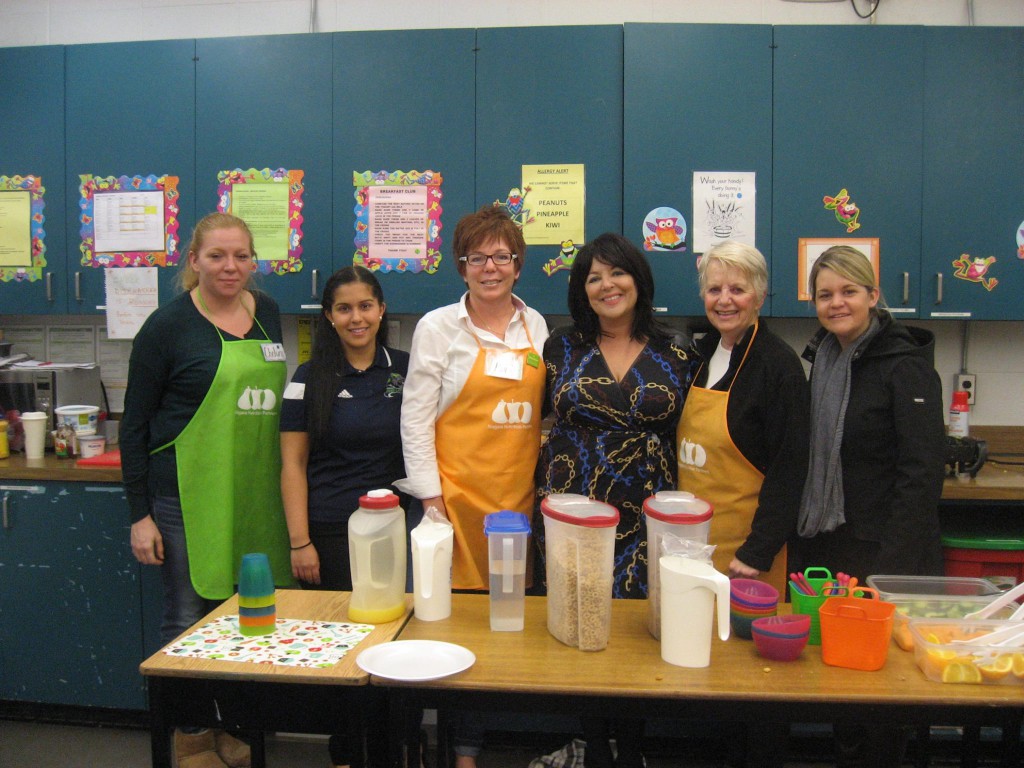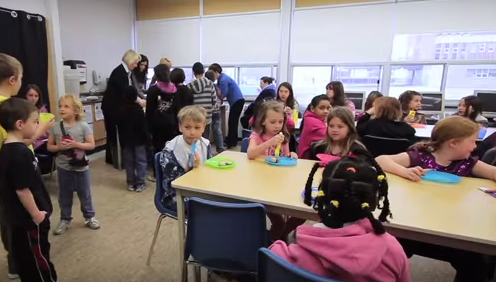 A number of diverse programs across the province are putting forth a vigorous effort to connect Ontario students to healthy food. Nutrition’s role in supporting education and development, after all, cannot be overstated.
A number of diverse programs across the province are putting forth a vigorous effort to connect Ontario students to healthy food. Nutrition’s role in supporting education and development, after all, cannot be overstated.
Niagara Nutrition Partners (NNP) is the body linking young students to good food across the Region of Niagara. Through their coordination of student nutrition programs (SNP) in elementary and secondary schools, NNP are helping to nourish more than 16,000 students every day.
Anne Kirkpatrick, NNP Program Manager, tells us it starts with a need; the schools are the ones to approach NNP if they would like to implement a program. And it’s clear the need is universal: Haldimand-Norfolk has 70 programs, Hamilton 170, and Brant 50 – Anne says Niagara is maxed out at 210.
June was a busy month for NNP, as they wrapped up all 210 of their programs as another school year came to an end. After just hosting their large Annual Gala, we spoke with Anne before their final fundraiser of the school year, a golf tournament.
NNP is able to offer their support to so many schools and students through much of their own fundraising efforts, alongside provincial grants.
Not only do these programs play a key role in nourishing young minds – their respected primary goal — they also provide the opportunity to build important connections in the community, and the results are wide-reaching. One of the most fruitful connections can be with the local agriculture community, when programs are able to source from local farmers.
But of course, great work doesn’t come without its challenges.
NNP began strategic planning three and a half years ago to pursue a number of pillars, one of which included making inroads with sourcing locally. But there have been some logistical barriers, specifically in terms of accessing and distributing local fresh produce.
A few years ago it was possible for the program coordinators to go to the farm stand down the street, but new food safety rules and processes have been set in place (farmers must now be Canada GAP certified).
However, Anne is excited about the potential. In April, she spoke at a Niagara Food Forum about their successful small pilot project with Lakelee Orchards, where 10 schools in St. Catharine’s had the opportunity to order two boxes of local apples or pears. Beth McIntee, the facilitator, collected the boxes from Lakelee, dropped them off at the NNP offices, and participating schools picked them up.
“When we look at Beth’s work last year and how well it was received, we’re excited about getting more fresh produce to kids, and we want to make this sort of option accessible for all,” Anne explains. “We want to grow that pilot project beyond 10 schools with a local supplier and a transportation system, but it’s a bit like putting a puzzle together.”
The pieces? A supplier, storage, pick-up and delivery. And, like a puzzle, they need those pieces at the right time, in the right place.
After Anne spoke at the Niagara Connects Food Forum, other attendees approached her offering some valuable connections, including storage in West Niagara, and trucks for delivery. The missing piece? They need a supplier in the area for September-June.
If you know of a potential supplier or producer, we encourage you to get in touch with Anne so they can bridge this connection before the next school year starts.
There’s certainly an opportunity for reciprocal growth within these programs: local food in schools nourishes students at the same time it nourishes local farmers and economies.
The 2016 school year wrapped up with NNP overseeing 210 programs at 150 participating schools through breakfast, lunch and snack programs.
The program first took root as a haphazard breakfast program in St. Catharines. Then in 1998, with funding from the Ministry of Children and Youth Services, it sprouted into a fully developed regional program. NNP accesses the funding from the Ministry of Children and Youth Services for the interested schools, and they receive 15% of the funding cost for running the program.
These programs are implemented on the ground by dynamic volunteers from the school and the broader community. The volunteers are just as much a part of the puzzle as the food.
“Over and above all, you need hands-on people at the schools to make it happen,” Anne explains. “It takes dedicated and diligent work: serving, training, menu planning, cleaning, groceries, Ministry nutritional guidelines to follow, and rules and regulations to keep top of mind.”
The word volunteer, Anne adds, covers a wide range of dedicated individuals. “The grandmas” at Quaker Road School in Welland have been volunteering twice a week at the school’s breakfast program for years.
You can meet the Grandma’s in this video, which offers an intimate look at NNP’s potent work in 4 of the schools:
“It’s very helpful and comforting knowing we can come to school and have breakfast and lunch,” two friends share in the video.
Be sure to learn more about Niagara Nutrition Partners, and the benefits of nutritious food in schools, on the NNP website.
